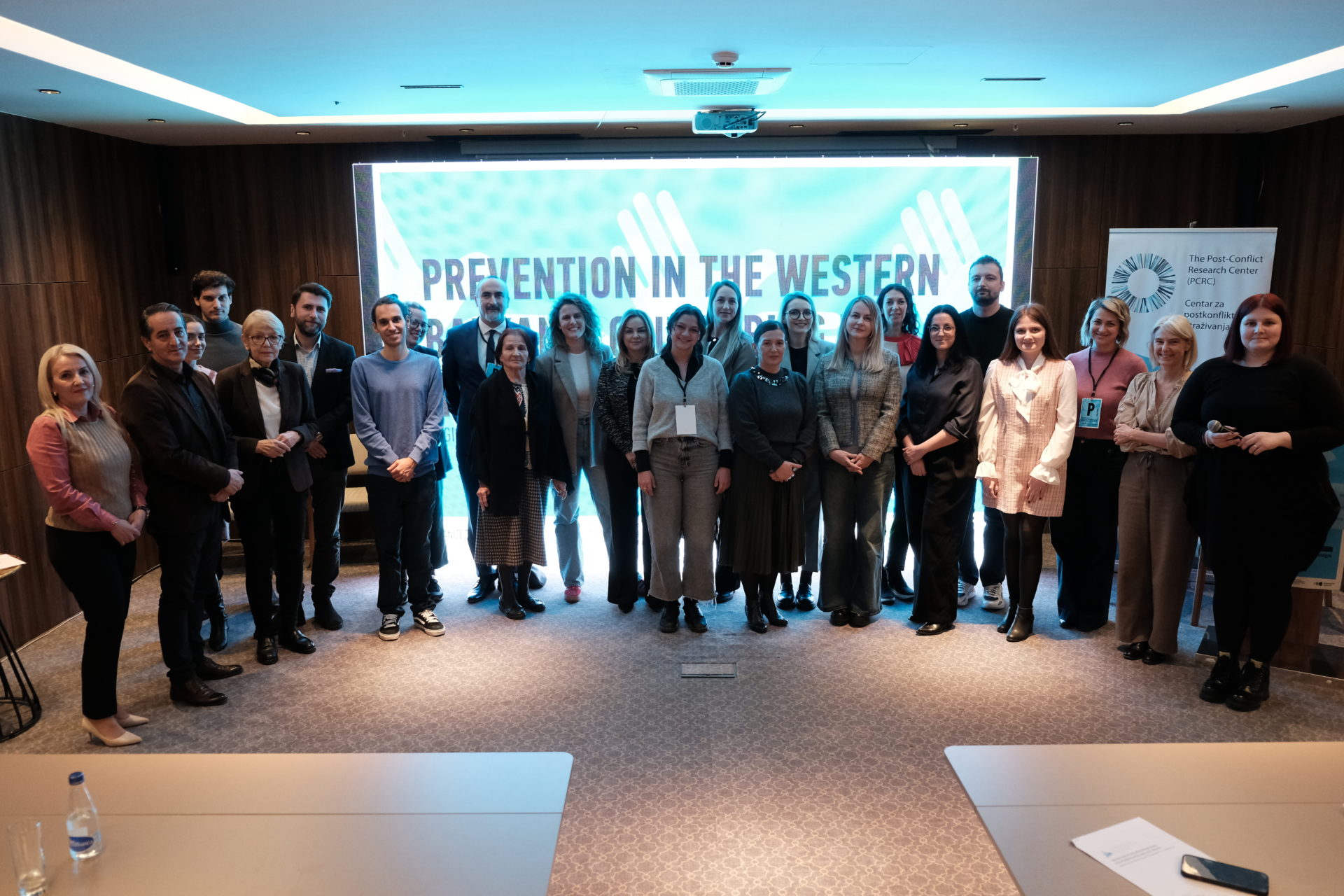
The Post-Conflict Research Center (PCRC), Impunity Watch, and the Western Balkans Coalition for Genocide and Mass Atrocity Crimes Prevention organized the second regional conference titled “Prevention in the Western Balkans: Countering Denial and Hate Speech.”
It took place on December 3-4 in Podgorica, Montenegro, bringing together civil society representatives from Bosnia and Herzegovina, Serbia, Croatia, Montenegro, North Macedonia, and Kosovo. The participants discussed strengthening civil society at the local level through collaboration with the international community and policymakers, focusing on developing strategies to counter new forms of hatred and challenges, defining necessary protection models, and formulating joint recommendations.
“Along with strategic discussions on how to improve our work, the purpose of this conference is also to provide a space to do more network-building at the regional level. This is your space for collaboration. There is a lot we can learn from each other, and there is a lot to cooperate on,” said PCRC President and Founder said Velma Šarić, addressing participants.
Šarić noted that in recent years, the region has witnessed a regression in dealing with the past, evidenced by a rise in denial and revisionism. She emphasized that civil society is especially affected by these trends, which significantly impact their operations and safety. Referring to a previous conference held in March, she stated: “The meeting specifically identified the issues of hate speech, denial, uninclusive education, and lack of community empowerment as key obstacles for dealing with the past.”
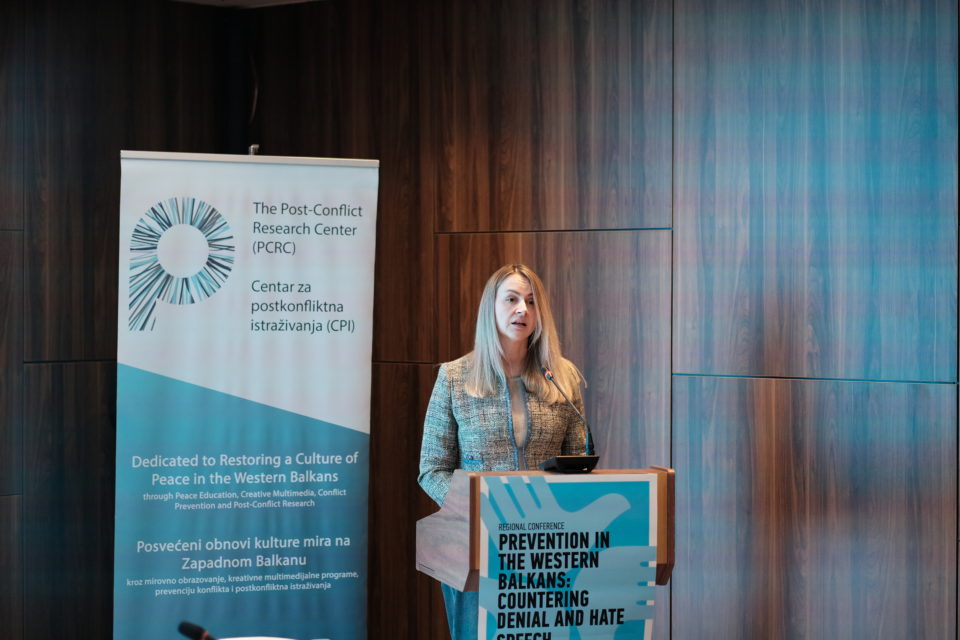
Marlies Stappers, Executive Director and Founder of the non-profit organization Impunity Watch, expressed concern about the sharp rise in denial and hate speech in the region. She emphasized that the focus of the meeting should be on addressing this important issue, which particularly affects those fighting for justice.
“It spreads fear, fosters destructive ideologies and leads to self-censorship, it undermines dialogue and efforts toward reconciliation,” said Stappers. She added that hate speech has been well-documented by international organizations, the media, and civil society, but responses often remain superficial.
“While revisionism is flourishing, we need to work on education. We need to explore more deeply the effects and consequences of discrimination. I know it is difficult to get into the formal education system to deal with the history of the war. But all forms of hate speech are nefarious and have to be combated,” explained Agnes Picod, Senior Human Rights Advisor at the United Nations Resident Coordinator’s Office in Bosnia and Herzegovina.
Kada Hotić, Vice President of the “Movement of Mothers of Srebrenica and Žepa Enclaves,” also addressed the attendees: “Hate has no place among us; we raised our children to be good people. It is crucial to talk about Srebrenica, ensuring that the truth is recognized and remembered.”
She recalled the years when the mothers fought for truth and justice in the aftermath of the 1995 Srebrenica genocide, highlighting the results they were able to achieve:
“We gave those who were killed their identity back. We fought for a cemetery, so they would have a place to be buried where the genocide was committed, in Potočari. We now have the [United Nations] resolution on Srebrenica. We also help the children of the victims and many families,” said Hotić.
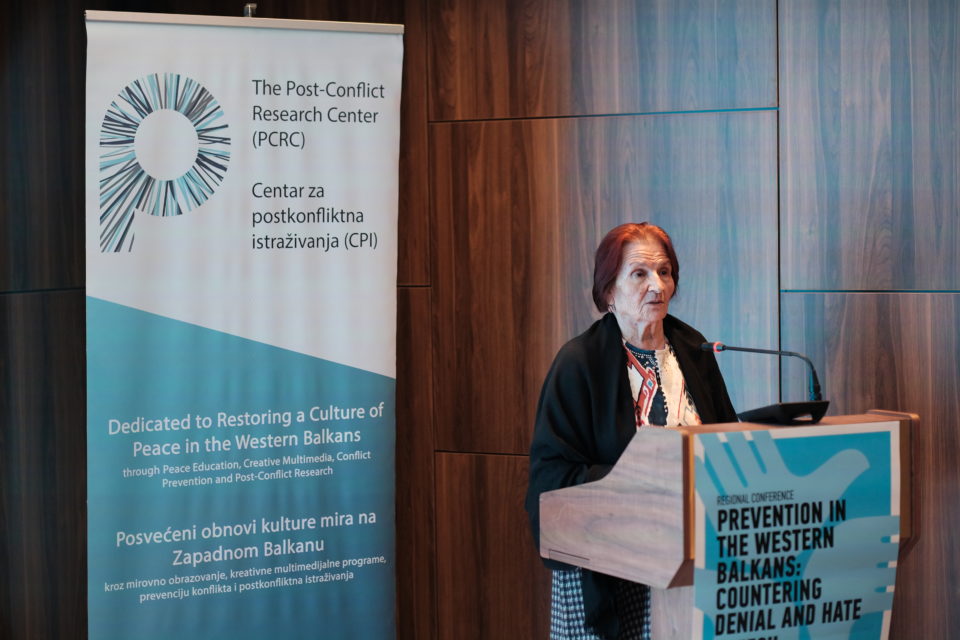
The conference is the result of the work of the Western Balkans Coalition for Genocide and Mass Atrocity Crimes Prevention, which was founded in 2017 by PCRC and the UN Office on Genocide Prevention with the aim of facilitating transnational cooperation in atrocity prevention. The establishment of the Coalition followed six years of genocide prevention seminars jointly organized by these institutions, with over 120 civil society organizations participating.
Addressing Hate Speech
The first panel of the conference “Prevention in the Western Balkans: Countering Denial and Hate Speech,” was dedicated to the topic of hate speech, engaging local perspectives on its societal impact and prevention challenges.
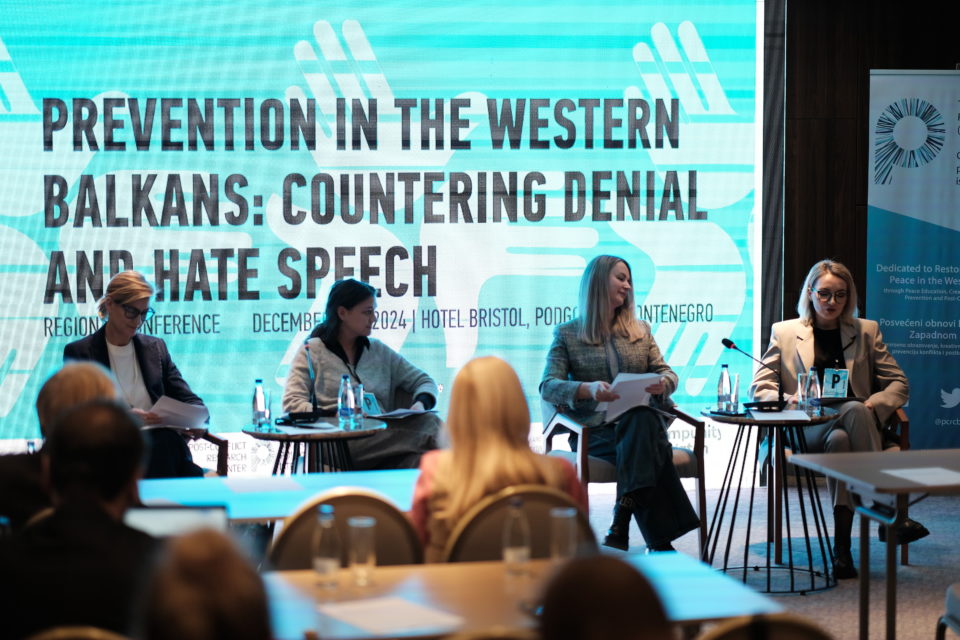
Emina Sinanović from the Association of Victims and Witnesses of Genocide explained their main role in the fight against impunity for war crimes and genocide denial. She said that through continuous pressure, the Association has achieved significant changes, including amendments to the Criminal Code of Bosnia and Herzegovina, a ban on convicted war criminals participating in elections, and the introduction of international verdicts for genocide and war crimes into the domestic criminal records.
Sinanović also expounded on the problem of genocide and war crime denial, particularly in the entity of Republika Srpska, “where the authorities have often challenged the existence of the state of Bosnia and Herzegovina and glorified war criminals.”
Mila Pajić from the Youth Initiative for Human Rights in Serbia shared insights on hate speech and denial in her country. She noted that hate speech is widespread in Serbian public spaces, particularly in the form of murals and graffiti, as well as speeches by politicians and media content.
According to Pajić, the Initiative has made several attempts to remove graffiti depicting Ratko Mladić in Belgrade and other cities. Despite reporting over 300 such graffiti across Serbia, the authorities have not responded. She added that this graffiti is typically not painted by ordinary citizens but by organized groups promoting divisive narratives.
“The messages on these walls are consequential, especially for young people, because they lack necessary knowledge. When they walk in the streets and see murals of Ratko Mladić and other war criminals every day, it normalizes their appearance in public space,” said Pajić.
Pajić contends that peacebuilding and reconciliation should promote the stories of positive and heroic individuals who exhibit courage and moral character in difficult times.
Tea Gorjanc Prelević from the Human Rights Action in Montenegro explained that their organization, while new to the Coalition, is very glad to be part of the larger effort, as collaboration in the Western Balkans is essential to prevent future atrocities.
“I was born into a multi-ethnic family. I had to perceive my world through human rights. I didn’t know anything else but to respect these differences. For me, the breakup of Yugoslavia was like the breakup of the world itself. It was the ideal world for me and my family. I believe that multi-ethnic and multi-religious societies have an advantage over homogeneous ones. What led to the breakup of Yugoslavia was dangerous Serbian nationalism. I’m not saying there weren’t others, but that was the worst,” said Gorjanc Prelević.
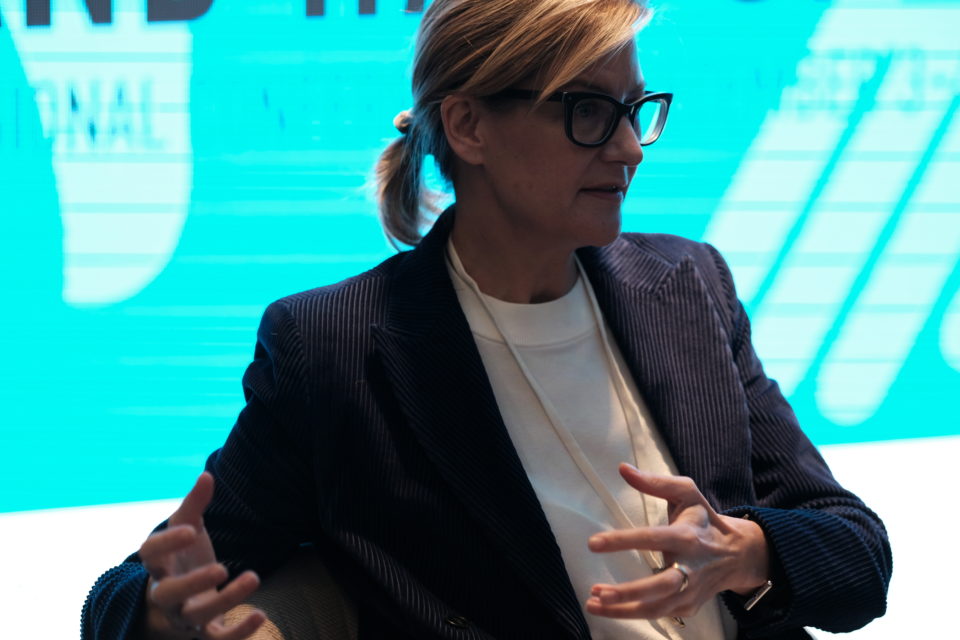
Today, she added, Montenegro is endangered by what Serbian leaders in 2020 described as the “Serbian world.”
“This has become an accepted idea—that all Serbs in the region see the Serbian president as their own, trying to unite all Serbs. And this is something we see in Montenegro, from Serbian municipalities here. They publicly emphasize their commitment to the Serbian idea, display the Serbian flag, celebrate Serbia’s statehood day, and this actually leads to the dominance of one ethnic group over others. This undermines the functionality of this state and does not represent its true image, because this is a multi-ethnic country.”
Prevention through Youth Education
At the second panel of the Conference, participants discussed the importance of prevention through youth education and community empowerment.
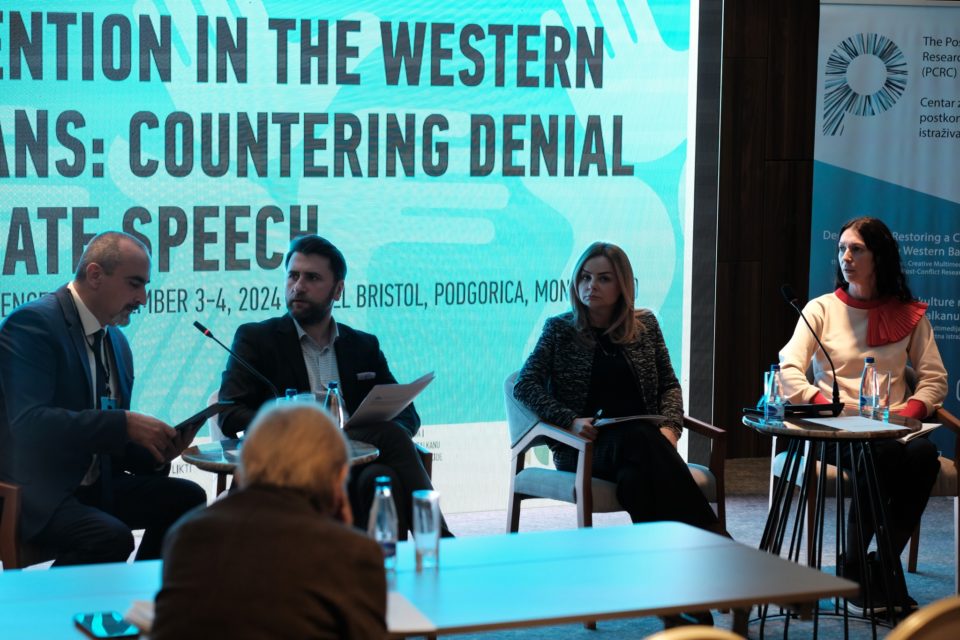
Daliborka Uljarević from the Center for Civic Education in Montenegro emphasized the crucial role of educational institutions in addressing difficult topics related to the past, stating: “We work with history teachers and educators to integrate these topics into the curriculum because alternative programs cannot replace formal education. Unfortunately, our formal education remains closed to these topics.”
She highlighted the challenges they face in the educational process, including frequent resistance from political actors who insist that, instead of focusing on the past, discussions should be about the economy and the future. “They don’t understand, or don’t want to understand, that we cannot move forward without confronting the past. We know that there is no economy without ideology, and this ideology reflects everything going on here today,” she said.
She also emphasized the problem of revisionism in Montenegro, where street names have recently been changed to honor wartime leaders and individuals associated with the Yugoslav People’s Army (JNA), who are presented as heroes to new generations.
Jelena Krstić from the Humanitarian Law Fund in Serbia highlighted that although their organization is not youth-focused, a significant portion of their activities involves young people. Krstić emphasized the importance of being mindful when approaching different types of stakeholders, including youth. She also noted numerous challenges Serbia faces in the current socio-political context.
“Preparing for this panel, I tried to come up with recommendations on how to move forward, but every idea ultimately seemed impossible. We have tried both formal and informal education, we’ve worked on various initiatives, but the successes have, at best, been partial and limited to small groups of people,” said Krstić. She added that in some cases, their efforts proved completely futile.
Krstić highlighted problematic initiatives within the educational system, such as an incident where a convicted war criminal was invited to deliver a lecture to high school students. “This reflects the reality in Serbia when it comes to youth and the broader community–a lack of knowledge about the past,” concluded Krstić.
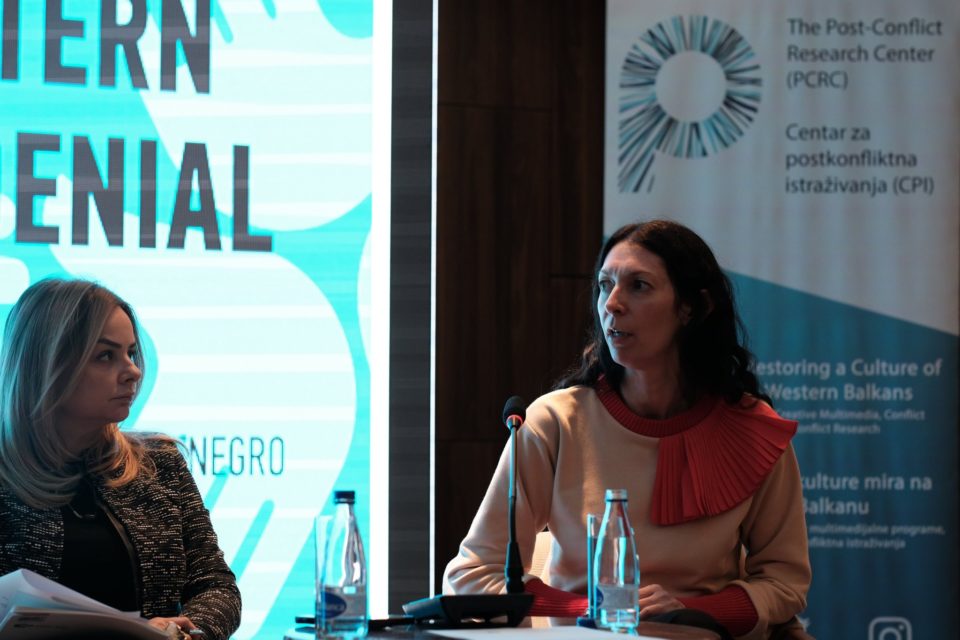
Vladimir Andrle, president of the Jewish Cultural and Educational Society La Benevolencija in Bosnia and Herzegovina, notes that youth education in the Balkans is shaped by a combination of inherited and contemporary challenges. According to him, many educational systems in the region continue to adhere to traditional models that prioritize theoretical knowledge at the expense of the practical skills necessary for the labor market. He emphasizes: “An education system that does not meet the needs of the labor market leads to high youth unemployment and a problematic disconnect between the skills acquired and those demanded by the economy.”
“An educated youth population with access to meaningful opportunities for participation and leadership in their communities can drive positive change,” said Andrle.
Prevention in the Western Balkans
The report “Building a Common Agenda for Prevention in the Western Balkans,” written by Branka Vierda, was also presented at the conference, offering recommendations for further steps to prevent conflict and strengthen regional cooperation. The report analyzes existing challenges and provides concrete proposals for improving prevention approaches through the engagement of civil society, institutions, and international actors.
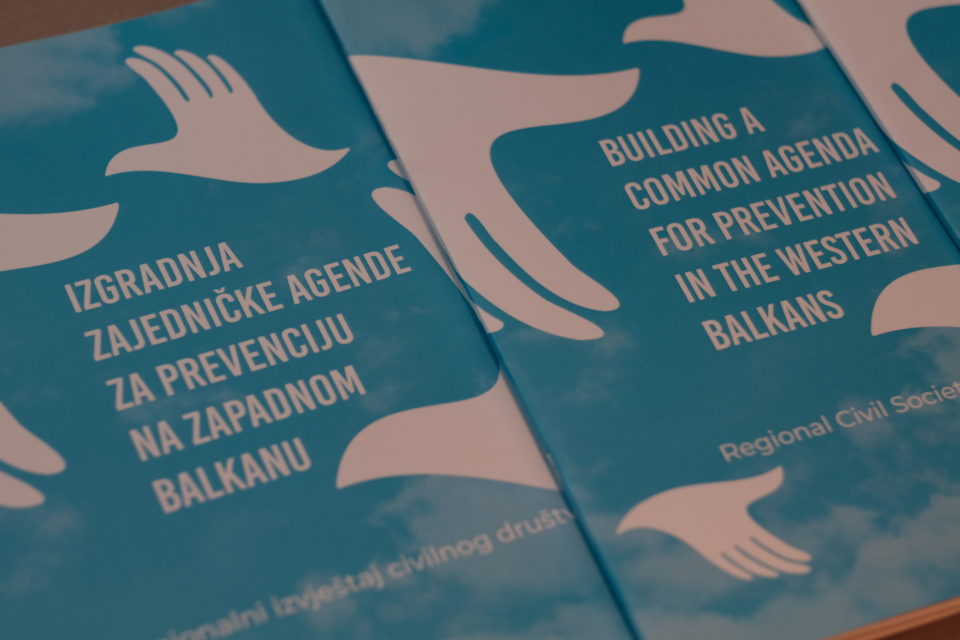
Emphasizing the importance of joint initiatives in preventing genocide and war crimes, Vierda described the report’s recommendations for specific actors, noting that it summarizes key discussions and conclusions from the conference held in March of this year.
“I sincerely hope that this report provides a coherent set of recommendations for all relevant actors and that it can serve as a tool for promoting regional cooperation through concrete and joint advocacy directions,” said Vierda.
Sonja Biserko, President of the Helsinki Committee for Human Rights in Serbia, emphasized the fragility of the current situation in the region and the need for continuous efforts to preserve the progress that has been made so far. She highlighted the importance of alternative education and the creation of educational content that provides a balanced and effective overview of historical facts to ensure quality education for young people.
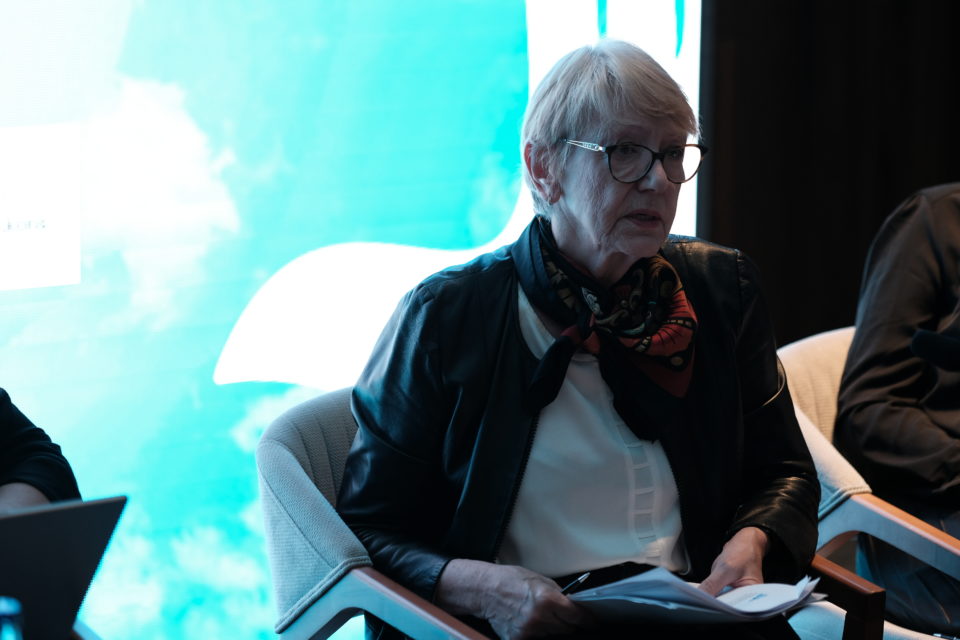
“There is significant potential for dialogue within religion, particularly on human rights. Unfortunately, this is not being realized. While reaching these groups is challenging, it doesn’t mean we shouldn’t try,” said Biserko, emphasizing the importance of sustained engagement and dialogue for further progress.
Zarja Marković from Humanity in Action Bosnia and Herzegovina advocated for continuity and vigilance in confronting the past, particularly on the subject of genocide. She said that according to Genocide Watch, the current situation in Bosnia and Herzegovina triples the likelihood of future genocide, necessitating unwavering attention and preventative action.
She also drew attention to the significance of non-legal processes in confronting the past, which can contribute to reconciliation. Marković mentioned a recent open letter by convicted war criminal Radoslav Krstić, which she believes could be a moment for everyone to respond positively, but she expressed concern over the lack of strong reactions to that initiative.
Empowering Civil Society and Regional Cooperation
The third panel discussed civil society empowerment and regional cooperation. This discussion identified steps that civil society organizations can take to influence policy and social change, as well as the importance of building mutual trust among the countries of the Balkans. The panelists emphasized the need for joint efforts to create sustainable mechanisms for addressing regional challenges, with a particular focus on including youth and marginalized groups in decision-making processes.
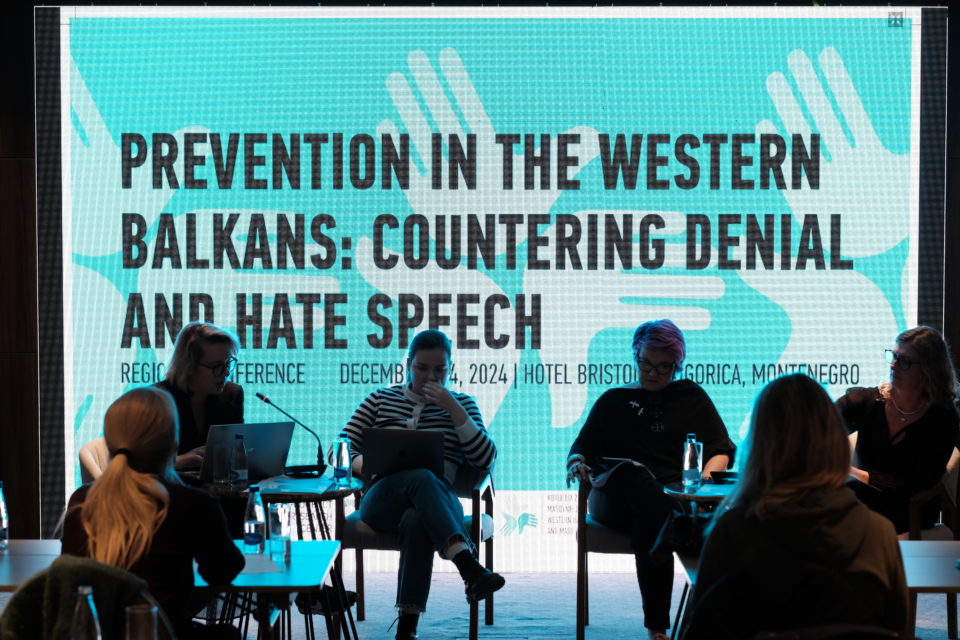
Senna Šimek, from the Youth Initiative for Human Rights in Croatia, emphasized the importance of addressing difficult questions about the past wars in the region, stressing the need to confront issues that many groups would prefer to forget.
Šimek believes that education is fundamental for preventing future conflicts, though she acknowledges that confronting the past in these contexts is not easy. “In societies where distorted narratives about past wars prevail, it is important to create space for alternative perspectives and adopt a critical approach to history. Confronting the truth, no matter how painful, is a prerequisite for building sustainable peace,” she stated.
She also mentioned a recent project led by the Initiative in which several activists adorned a Christmas tree in Zagreb with cardboard ornaments bearing young people’s wishes, addressed to politicians. This action, which calls for confronting the past and achieving accountability for committed crimes, sparked intense public reactions, particularly regarding the demand that convicted Croatian war criminals be stripped of their medals.
Ljiljana Siničković from the Forum Civil Peace Service (ForumZfD) in Bosnia and Herzegovina noted: “We still need to figure out how to involve all young people in dealing with the past. And we cannot talk about this without mentioning education. Together with the Post-Conflict Research Center, we created the first instructional manual on peace education for teachers and educators. However, we also need to continue the discussion on how to support these teachers in their local communities, especially if their community is not willing to lend them support.“
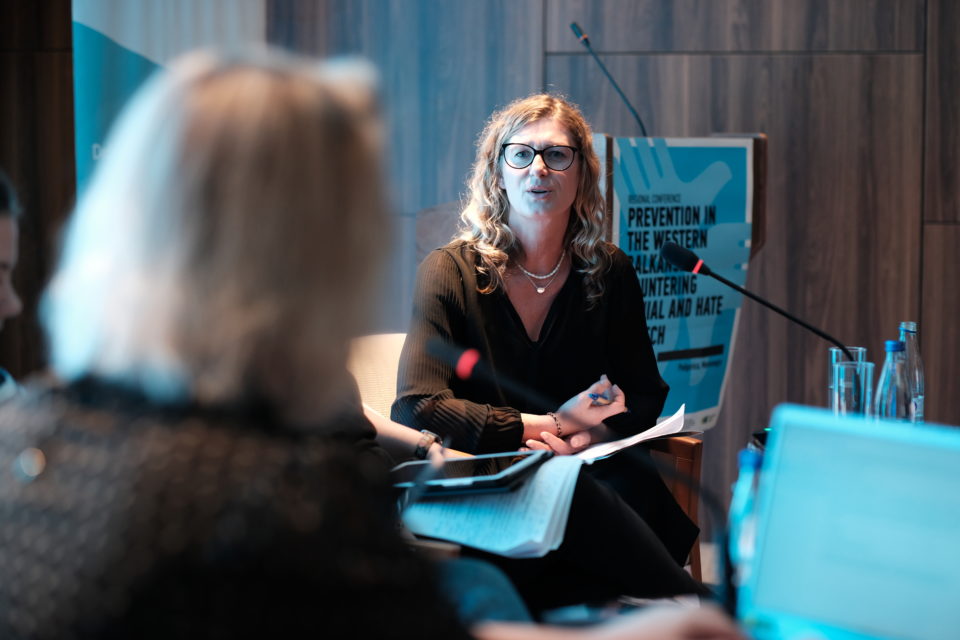
In 2021, PCRC partnered with the Educators’ Institute for Human Rights (EIHR), and ForumZfD to prepare the first formal peace education manual for teachers, which covers a variety of peace-related topics. This didactic guide, titled The Holocaust and Peace: Lessons from the Past for the Future, is designed as a resource for educators, teachers, students, and anyone working with youth in formal and non-formal educational settings.
The guide includes four modules and eleven interconnected lessons covering topics such as the causes and consequences of mass atrocity crimes, human rights, building a constructive and inclusive culture of remembrance, and the importance of language and literature for peacebuilding. With these themes, the manual aims to promote peace both in the classroom and beyond.
Dajana Cvjetković from the Center for the Promotion of Civil Society in Bosnia and Herzegovina recognized that non-formal education has its limitations, as NGO programs only reach a small number of people. She stated that true progress depends on empowering more individuals to address sensitive topics.
Inclusive Memorialization in the Western Balkans
The final panel of the conference, “Inclusive Memorialization in the Western Balkans,” explored ways to engage all relevant communities in processes of remembrance and education about past wars and genocides. The discussion focused on creating memorial spaces and initiatives that reflect diverse perspectives, contributing to reconciliation and shared understanding. The panel highlighted both the challenges and benefits of developing inclusive memorial practices in post-conflict societies.
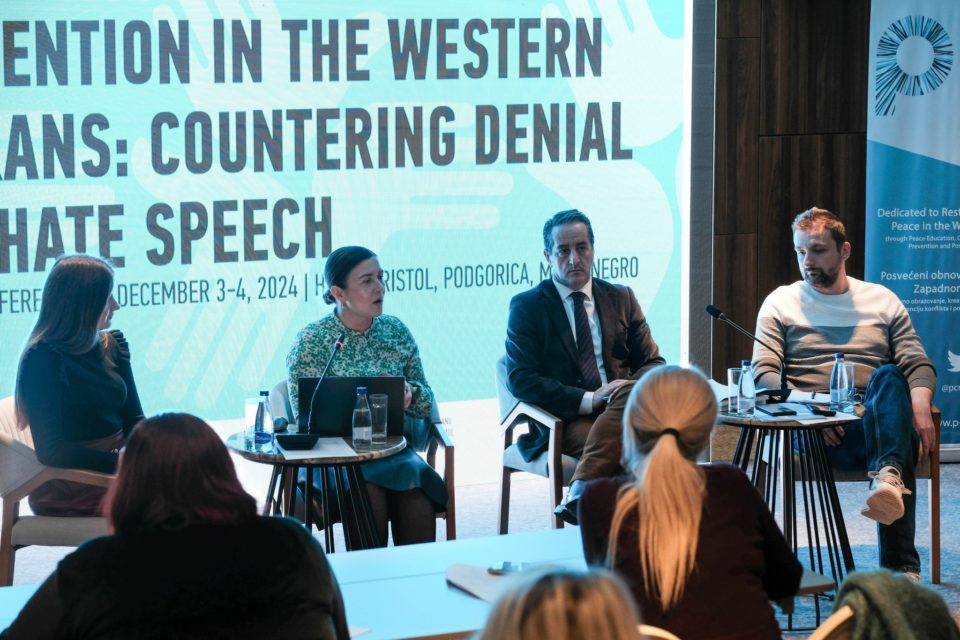
Selma Korjenić from Trial International in Bosnia and Herzegovina emphasized that monuments, museums, and commemorative activities are indispensable tools in the fight against denial due to their educational nature. She added that collaboration between artists and civil society represents a crucial turning point in the pursuit of truth.
“Civil society organizations are catalysts for governmental accountability in building historical memory and commemoration,” she stated.
Discussing gender sensitivity in transitional justice, Korjenić emphasized that significant strides have been made, but it is crucial to understand the root causes of violence to address its long-term effects. Inclusive remembrance, she stated, should connect judicially established truth with collective memory, thereby creating a bridge between justice and societal awareness.
Bekim Blakaj from the Humanitarian Law Center in Kosovo highlighted the lack of proper regulation for memorials in his country. “Memorials in Kosovo lack regulation and many of them are erected on private property and unmonitored, leading to hate speech in their wording and messaging. This is evident in both Kosovo Albanian and Serb communities,” he stated.
He added that many streets, squares, and parks in Kosovo bear the names of military heroes, whose images are displayed on monuments and memorial complexes erected after the war. However, civilian victims—women, children, and men—have not received the same recognition.
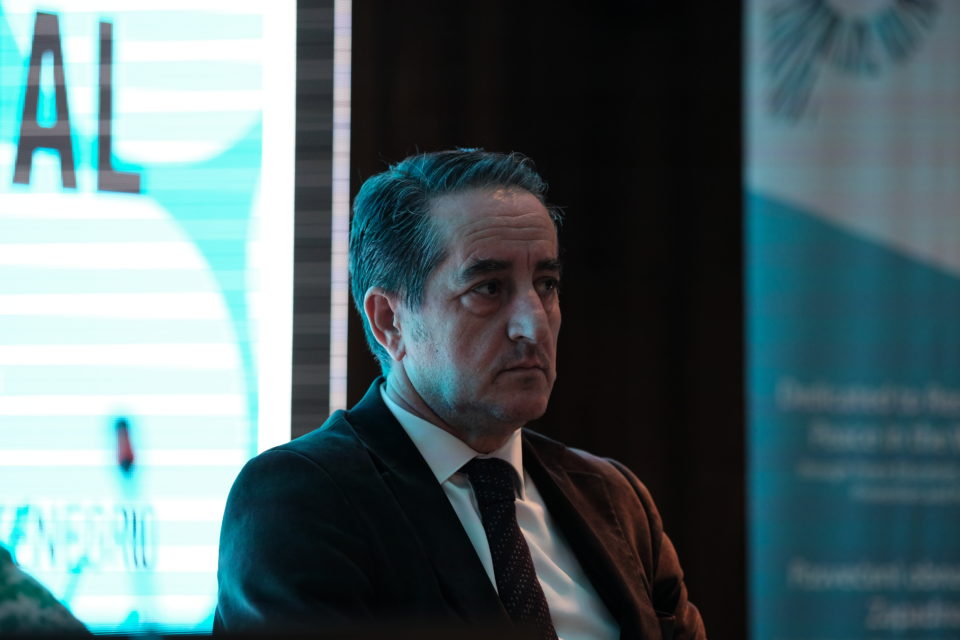
Edvin Kanka Ćudić from the Association for Social Research and Communications in Bosnia and Herzegovina stated that, unlike Serbia and Croatia, where there is a single official narrative about the war, Bosnia and Herzegovina has three conflicting narratives. “Former military members have large monuments, while civilian war victims are often commemorated with plaques. Perhaps the best example of memorialization can be found in Brčko, where monuments for the three armies are located just a few hundred meters apart,” Ćudić explained.
He explained that memorialization is a key aspect of dealing with the past, as it helps to preserve the memory of victims, safeguard historical truth, and renormalize relations among communities. On the other hand, he noted that monuments often are used to promote exclusive victimhood narratives, as groups frequently emphasize their own suffering without acknowledging the suffering of others.
The conference “Prevention in the Western Balkans: Countering Denial and Hate Speech” brought together regional stakeholders to address the challenges of hate, genocide denial, and revisionism. Civil society, as a driver of change, must play a central role in combating these phenomena. Initiatives and strategies were presented, with panelists emphasizing the importance of education and confronting the past as the foundation for preventing future conflicts.
The harmful societal effects of hate speech and the rise in extreme rhetoric were also emphasized, illustrating the need to foster initiatives that promote positive social values. Despite existing obstacles, such as political resistance to educational efforts to confront the past, the participants agreed that true peace requires attention to educating youth, promoting critical thinking, and eliminating all forms of revisionism.
The first day of the conference also featured the opening of the exhibition “On the Margins,” created by PCRC and the OSCE. This exhibition highlights the lived experiences of the Roma community in Bosnia and Herzegovina, where they constitute the largest ethnic minority. This community, with its rich history, traditions, and culture, still faces numerous social, economic, and political challenges. Velma Šarić and Glorija Alić from the OSCE Mission to BIH stressed the need to protect basic Roma rights.





